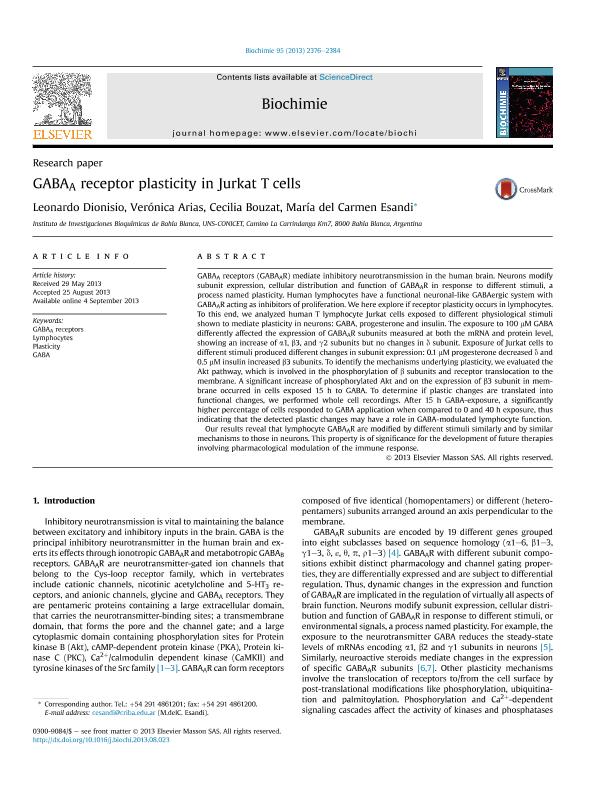Mostrar el registro sencillo del ítem
dc.contributor.author
Dionisio, Leonardo Raul

dc.contributor.author
Arias, Verònica Cecilia

dc.contributor.author
Bouzat, Cecilia Beatriz

dc.contributor.author
Esandi, María del Carmen

dc.date.available
2019-05-22T19:19:51Z
dc.date.issued
2013-12
dc.identifier.citation
Dionisio, Leonardo Raul; Arias, Verònica Cecilia; Bouzat, Cecilia Beatriz; Esandi, María del Carmen; GABAA receptor plasticity in Jurkat T cells; Elsevier France-editions Scientifiques Medicales Elsevier; Biochimie; 95; 12; 12-2013; 2376-2384
dc.identifier.issn
0300-9084
dc.identifier.uri
http://hdl.handle.net/11336/76888
dc.description.abstract
GABAA receptors (GABAAR) mediate inhibitory neurotransmission in the human brain. Neurons modify subunit expression, cellular distribution and function of GABAAR in response to different stimuli, a process named plasticity. Human lymphocytes have a functional neuronal-like GABAergic system with GABAAR acting as inhibitors of proliferation. We here explore if receptor plasticity occurs in lymphocytes. To this end, we analyzed human T lymphocyte Jurkat cells exposed to different physiological stimuli shown to mediate plasticity in neurons: GABA, progesterone and insulin. The exposure to 100 μM GABA differently affected the expression of GABAAR subunits measured at both the mRNA and protein level, showing an increase of α1, β3, and γ2 subunits but no changes in δ subunit. Exposure of Jurkat cells to different stimuli produced different changes in subunit expression: 0.1 μM progesterone decreased δ and 0.5 μM insulin increased β3 subunits. To identify the mechanisms underlying plasticity, we evaluated the Akt pathway, which is involved in the phosphorylation of β subunits and receptor translocation to the membrane. A significant increase of phosphorylated Akt and on the expression of β3 subunit in membrane occurred in cells exposed 15 h to GABA. To determine if plastic changes are translated into functional changes, we performed whole cell recordings. After 15 h GABA-exposure, a significantly higher percentage of cells responded to GABA application when compared to 0 and 40 h exposure, thus indicating that the detected plastic changes may have a role in GABA-modulated lymphocyte function. Our results reveal that lymphocyte GABAAR are modified by different stimuli similarly and by similar mechanisms to those in neurons. This property is of significance for the development of future therapies involving pharmacological modulation of the immune response.
dc.format
application/pdf
dc.language.iso
eng
dc.publisher
Elsevier France-editions Scientifiques Medicales Elsevier

dc.rights
info:eu-repo/semantics/openAccess
dc.rights.uri
https://creativecommons.org/licenses/by-nc-sa/2.5/ar/
dc.subject
Gaba
dc.subject
Gabaa Receptors
dc.subject
Lymphocytes
dc.subject
Plasticity
dc.subject.classification
Otras Ciencias Biológicas

dc.subject.classification
Ciencias Biológicas

dc.subject.classification
CIENCIAS NATURALES Y EXACTAS

dc.title
GABAA receptor plasticity in Jurkat T cells
dc.type
info:eu-repo/semantics/article
dc.type
info:ar-repo/semantics/artículo
dc.type
info:eu-repo/semantics/publishedVersion
dc.date.updated
2019-05-14T21:34:58Z
dc.journal.volume
95
dc.journal.number
12
dc.journal.pagination
2376-2384
dc.journal.pais
Francia

dc.journal.ciudad
París
dc.description.fil
Fil: Dionisio, Leonardo Raul. Consejo Nacional de Investigaciones Científicas y Técnicas. Centro Científico Tecnológico Conicet - Bahía Blanca. Instituto de Investigaciones Bioquímicas de Bahía Blanca. Universidad Nacional del Sur. Instituto de Investigaciones Bioquímicas de Bahía Blanca; Argentina
dc.description.fil
Fil: Arias, Verònica Cecilia. Consejo Nacional de Investigaciones Científicas y Técnicas. Centro Científico Tecnológico Conicet - Bahía Blanca. Instituto de Investigaciones Bioquímicas de Bahía Blanca. Universidad Nacional del Sur. Instituto de Investigaciones Bioquímicas de Bahía Blanca; Argentina
dc.description.fil
Fil: Bouzat, Cecilia Beatriz. Consejo Nacional de Investigaciones Científicas y Técnicas. Centro Científico Tecnológico Conicet - Bahía Blanca. Instituto de Investigaciones Bioquímicas de Bahía Blanca. Universidad Nacional del Sur. Instituto de Investigaciones Bioquímicas de Bahía Blanca; Argentina
dc.description.fil
Fil: Esandi, María del Carmen. Consejo Nacional de Investigaciones Científicas y Técnicas. Centro Científico Tecnológico Conicet - Bahía Blanca. Instituto de Investigaciones Bioquímicas de Bahía Blanca. Universidad Nacional del Sur. Instituto de Investigaciones Bioquímicas de Bahía Blanca; Argentina
dc.journal.title
Biochimie

dc.relation.alternativeid
info:eu-repo/semantics/altIdentifier/url/https://www.sciencedirect.com/science/article/pii/S0300908413002952
dc.relation.alternativeid
info:eu-repo/semantics/altIdentifier/doi/http://dx.doi.org/10.1016/j.biochi.2013.08.023
Archivos asociados
